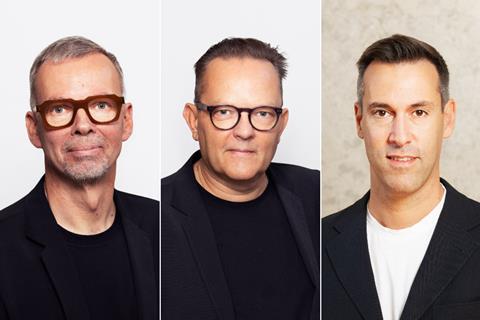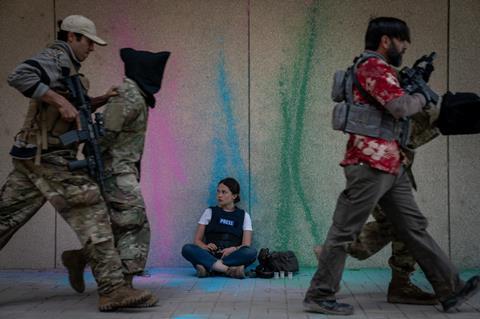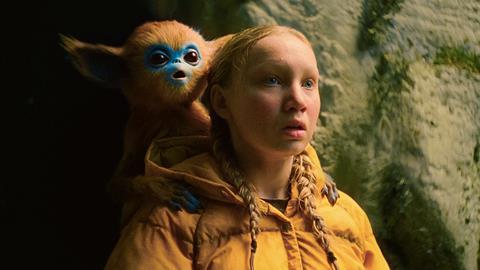“For the film and TV industry, it’s not easy to access the traditional investment client base.”
So says Andrea Scarso, partner and investment director at IPR.VC, the investment fund manager that has raised more than $220m (€200m) across three funds, and secured its latest slate financing deal with mk2 Films in September. “It takes a lot of time to speak the language and understand how the sector works. We’re bridging that gap.”
IPR.VC has recently renewed its partnership with A24 and is co-financing the US outfit’s upcoming titles, including Josh Safdie’s Marty Supreme with Timothée Chalamet, Celine Song’s Materialists, Ari Aster’s Eddington, Isaiah Saxon’s The Legend Of Ochi and David Lowery’s Mother Mary.
Founded in Finland and with 10 staff across its offices there and in London, IPR.VC is an equity financier, taking money from institutional investors, pension funds, family offices and non-profit sector investors, and investing it in film and TV productions. In November 2023, it launched its third fund with a $110m (€100m) target, which it has already passed, with aims for $150m (€140m) by the time the fund closes in March 2025. “We’re hoping to bring new private money into the industry — an industry that very much needs that kind of money,” says Scarso.
IPR.VC was founded by Finnish executives Timo Argillander and Tanu-Matti Tuominen in 2014, when the latter was working with technology investment funds. “Media and content was so underserved,” says Tuominen. “There was a lack of capital in this business and there was no channel for it. It was a product and market fit — for the investors and investees.”
The duo launched two funding rounds. The first, in 2015, invested in several media formats, including music, before a second fund in 2019 concentrated on film and TV. Italy-born Scarso joined in November 2023 after 12 years managing assets at London-based creative industries investor The Ingenious Group.
Over half the money raised from IPR.VC’s funds has already been invested against film and television projects in Europe and the US. Many of these projects have come through IPR.VC’s slate partnerships, signed with XYZ Films, A24 and, most recently, mk2 Films. The key decision comes when choosing their partners. “It’s about getting to know the people, seeing their track record, seeing their connections with talent and vision for the future,” says Argillander. “If we are aligned with those, we have potential to do an investment.”

The trio then collaborate with the companies on a plan for how much will be invested and in which projects. “[The companies] don’t cherry-pick the projects they do [with us],” says Scarso. “We agree on a path forward; we get involved in everything they do within the framework we’ve agreed.”
The companies are free to make other projects outside of the IPR.VC partnership, and the trio take executive producer credits on select projects. Scarso notes they have “visibility over the creative process… but it’s not our role to make creative decisions. Our role is to provide financing expertise.” They also provide advice on commercial deals, including with sales companies and distributors.
Argillander believes IPR.VC fills a gap in the market. “There is less commissioning of projects, less money coming from channels, streamers are less open to buying the whole world,” says the executive. “They are picking individual territories; they are often coming on board later rather than commissioning. Which means that financing for production has changed.
“On the film side, the market is getting more difficult; on the television side, it is inheriting the way that films are financed — building the finance from bits and pieces. That’s where we are coming in,” continues Argillander. “We are risk investors — we know there is demand for capital, which can carry risk. There are not so many investors like ours in the marketplace. The innovation on the investment side is taking more risky positions but also looking for higher upsides.”
Equity investment
With Tuominen joining on Zoom from Helsinki, Screen is speaking to the executives at their London office, which displays posters of recent projects including Civil War. Alex Garland’s thriller was A24’s most expensive feature to date, with a reported $50m budget, and its second highest-grossing at $122m worldwide. IPR.VC does not invest in the companies themselves, but rather provides money that goes directly into the finance plans of individual projects.
“Our returns arise from the individual performance of these projects,” says Scarso. The amount of investment in each film ranges from 10% to 100% “in rare cases”, adds Argillander. “Typically it’s minority [investment], a combination with tax incentives, maybe some pre-sales, co-production arrangements. We are the one bringing the equity part.”

“With A24, they provide a lot of the capital themselves,” says Scarso. “We come in as small investors. For the collaborations with mk2 and XYZ, we can be majority [investors].”
With capital remaining in the third, ongoing fund, IPR.VC is starting a slate of European TV investments, separate from its agreements with the aforementioned companies. Projects include Hildur, an adaptation of Satu Rämö’s crime novel series, which begins filming in Iceland next year produced by Finland’s Take Two Studios, with a per-episode budget of $1.1m (€1m).
“It’s going to be focusing on European content, and what can become returning series within the European co-production model, made for an international audience,” says Scarso of the TV projects. “They will all have elements that can travel.”
The company is shaping its own future through research and development arm IPR Lab, launched in June 2024, which aims to find opportunities and trends within media. “We can challenge the way we are investing today and find new ways we can invest in the future,” says Argillander of the R&D department, run by Victoria Fäh from London. “We are looking a lot more at the creator economy and short-form content, merging film and video games.”
With the imminent closure of the third fund, IPR.VC is already at work on future investment rounds. “We always have plans for two funds ahead of what we are now investing,” says Tuominen. “We have a hunch of what fund number five will be and when.” The success of the three funds so far allows this acceleration, says Scarso. “The idea is we don’t have to wait four years. We’re probably going to launch another fund, with a different strategy, within a year or two.”
“It’s also important for our investors. We distribute capital back for them much faster than normal buyers funds,” says Tuominen. “The idea is to circulate the capital.”
The company works with fewer than 50 different investment partners, all based in the Nordics, having opted for a steady growth across its first 10 years over a rapid ascent. “We know them personally,” says Tuominen. “It’s a great thing that the investors have trusted us in giving capital.”
“The future should lead us to grow the investors base outside the Nordics in a more international fundraising capacity, and for us to raise and deploy more capital in the content industry,” says Scarso. “The goal is to establish ourselves as the primary financiers in Europe. That’s a position where we already are, but we can grow even more.”

























No comments yet